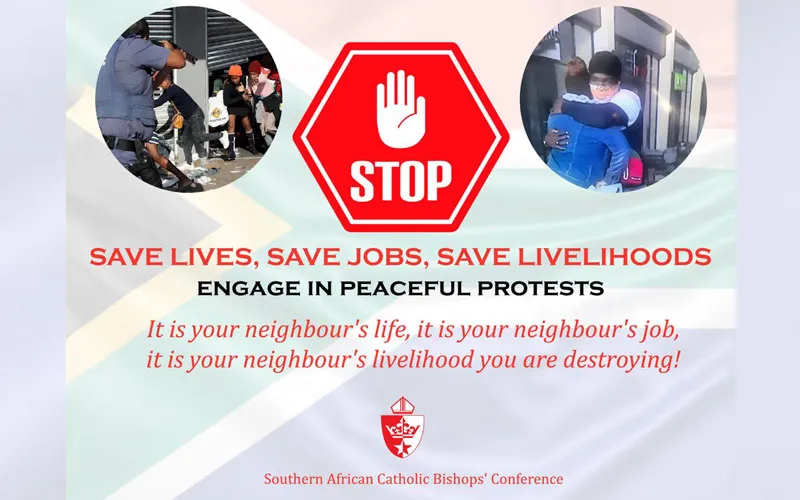The Catholic Church leaders call on the people not to put the lives of others at risk by creating avenues for the spread of the COVID-19 through the protests and violence.
“We must also remember that we are in the height of COVID-19 pandemic that thrives in the conditions of disorder that we see, and that the longer these conditions prevail, the more we put ourselves and others in danger of infection that will be difficult to deal with,” they say.
They have appealed to those inciting the violence and looting for political ends “to rise above political interests, to protect life and to preserve the common good.”
The members of SACBC further recall that it was only dialogue and not violence that brought democracy to South Africa many years ago.
They admit that people are going through a lot of suffering but urge caution saying, “As we navigate some difficult routes of this democratic journey let us continue to choose the path of dialogue to settle our differences as brothers and sisters united by the love of our country and the desire for its prosperity for the good of all who reside and work in it.”
(Story continues below)
They explain, “The path of dialogue is long and arduous, but it is the only one that can help us to keep our attention focused, to penetrate to the heart of matters, and to recognize what is essential.”
The Catholic Bishops further admit that the country is going through a crisis that they say has been occasioned hugely by extreme economic inequalities as well as economic hardships suffered by the poor during the pandemic.
They say that the government, business and the corporate sector have, over the years, failed to address social issues affecting the people in a comprehensive manner.
According to the Catholic Bishops, what started off as a difference of opinion has sparked off a wildfire of violence and looting because the “dry grass of poverty has been left to overgrow over decades.”
“A big contributing factor to this ‘dry grass’ of poverty is the lack of efficient leadership in government and unethical practices in business,” SACBC members say in their July 13 statement shared with ACI Africa.
They add, “We call for a return to efficient leadership at all levels of government that will see service being delivered to the people and business enabling all to participate meaningfully in the economic system.”
Officials of the Jesuit Institute South Africa have also joined the call to those involved in violence “to stop immediately.”
“It is our own brothers and sisters that we are harming, not the elites or political tricksters who live securely and are shielded from the violence and destruction. They are not affected; they do not suffer. We appeal to you; stop the violence for your own sakes!” members of the Society of Jesus (Jesuits) say in their July 13 statement.
They further urge politicians from all persuasions to stop using the ongoing crisis in South Africa to manipulate people by spewing irresponsible comments and incitements in mainstream media and on social media.
“You are not showing leadership by being politically expedient and this incitement must be condemned,” the Jesuits say in their message to politicians in the country, and add, “Those who are inciting people on social media must be held accountable. Social media platforms have the moral responsibility to monitor incitement.”
The Jesuits further call for the return to the rule of law, urging those in leadership to ensure that right processes in the country’s constitution and the judiciary system are respected.
Further, they call on religious leaders to address their followers and to offer direction as South Africa goes through what they refer to as a terrible crisis.
The Jesuits further call on those in leadership to ensure that South Africa’s high levels of poverty, inequality, and unemployment are “not addressed, but acted upon in a concrete manner” and that corruption is dealt with decisively.
“South Africans are tired of empty promises. Corruption has to be stamped out because this is a strong ingredient in the current crisis,” the Jesuits say.
They reiterate the message of other religious leaders who have called for the end to violence in the country, saying, “The liberty of all is threatened if South Africa responds to the massive challenges we face on the current violent trajectory.”
“Our hard fought for democracy is at stake and will lead to the wholesale destruction of this land. The civil anarchy and mayhem must end,” they say, and add, “We appeal to all South Africans to stop the violence. Serious problems afflict us, this is undeniable, but violence will never move us forward.”
Agnes Aineah is a Kenyan journalist with a background in digital and newspaper reporting. She holds a Master of Arts in Digital Journalism from the Aga Khan University, Graduate School of Media and Communications and a Bachelor's Degree in Linguistics, Media and Communications from Kenya's Moi University. Agnes currently serves as a journalist for ACI Africa.








